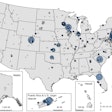
What was the secret to South Korea's success in controlling the COVID-19 pandemic? A new study indicates that point-of-care testing played an important role in reducing the spread of SARS-CoV-2 there compared to the U.S., which has experienced 47 times the number of cases and almost 80 times the number of deaths.
South Korea's response to the COVID-19 pandemic has been widely lauded -- and is becoming heavily studied. The country was one of the earliest countries to see cases appear after the novel coronavirus outbreak began in Wuhan, China, but was still able to control the spread of the virus better than other countries that had more time to prepare.
Widespread, free, and rapid point-of-care testing, meticulous tracing, and quarantine of all contacts has led to fewer COVID-19 deaths in South Korea than in the U.S., according to a commentary published in the American Journal of Medicine.
Those factors, along with masking, social distancing, crowd avoidance, and frequent hand and face washing are likely to be at least as effective as any safe vaccine, according to the authors.
Dr. Joshua Solano and colleagues compared the response to COVID-19 in South Korea as well as the U.S. After adjusting for population, the U.S. has suffered 47 times more cases and 79 times more deaths than South Korea, according to Solano, assistant professor of integrated medical science and director of quality improvement and patient safety at Florida Atlantic University's Charles E. Schmidt College of Medicine.
However, at the beginning of the pandemic, more COVID-19 cases existed in South Korea than anywhere else in the world outside of China. Today, the country has approximately 14,269 cases and 300 deaths. That compares to 5.7 million cases and 177,000 deaths in the U.S. as of August 24.
South Korea accomplished this feat because of testing, tracing, quarantining, masking, social distancing, and good hygiene, the authors added.
The authors contrasted the South Korean approach to COVID-19 with that of the U.S., which the authors characterized as fragmented, with no containment or mitigation strategies launched at the federal level. What's more, the authors bemoaned the politicization of wearing masks as an infection mitigation strategy.
The authors closed by stating that "those who do not understand the lessons of history are doomed to repeat them," and warned that the U.S. could be on track for a repeat of the Spanish flu epidemic in the early 20th century, when 675,000 Americans died.
"It is now imperative that the U.S. abandon 'pandemic politics' and focus on effective public health strategies," they concluded.



















